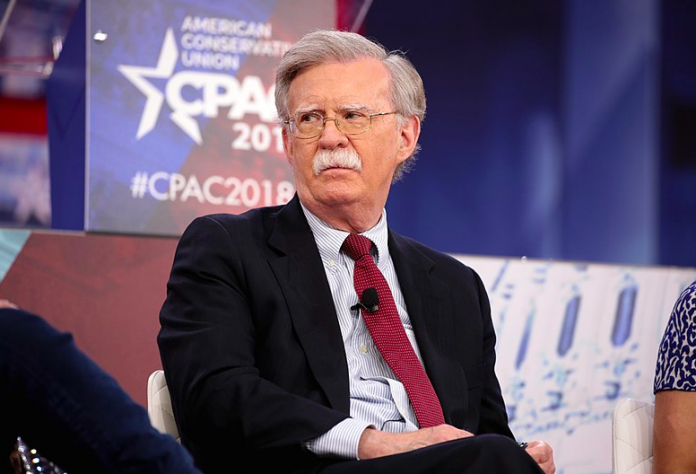
PYONGYANG –North Korean leader Kim Jong-un announced today that he was resigning and appointing John Bolton as the country’s new supreme leader.
Kim, apparently acting under duress, declared, “I’ve made important concessions on our nuclear weapons program but nothing seems to satisfy the USA. So let’s see if Bolton can do it any better.”

Prior to his ascension to power, Bolton was Donald Trump’s national security advisor known for his hardline anti-communist views.
Chairman Bolton, as he now prefers to be called, attended the Pyongyang press conference dressed in a blue Mao jacket buttoned at the collar. In an apparent concession to Korean custom, Chairman Bolton shaved his famous walrus mustache, noting that no previous North Korean leader had such prominent facial hair.
Bolton agreed to continue certain other North Korean customs. After the Pyongyang press conference, he was feted by 100,000 synchronized dancers packed into Rungrado May Day stadium. Others in the adoring crowd held up placards displaying the visage of Donald Trump, hair flapping in the wind.
Over a booming but antiquated public-address system, Bolton declared, “I plan to reunify the two Koreas under my rule in order to promote peace, prosperity, and free-market capitalism,”
The crowd erupted in spontaneous applause and unfurled banners of smiling workers, peasants and financial advisers.
Bolton announced that the name of the new country would be the People’s Capitalist Democracy of Korea. The White House had originally decided on “The Trumpian State of Korea,” but didn’t want to offend local sensibilities.
Bolton’s ascension to power came as the logical outcome of his policies. By raising demands impossible for North Korea to meet, regime change was the only remaining option. And who better to lead the new regime than John Bolton?
Bolton also announced the removal of South Korea’s elected president, Moon Jae-in, who had objected to Bolton’s policies for some time.
“US troops based in Seoul will continue to maintain peace and stability under my rule,” said Bolton. “We will hold free elections throughout the Korean peninsula sometime soon. A few miscreant South Korean politicians who have tried to obstruct progress will face justice at special US courts established in Guantanamo, Cuba.”
The surprising turn of events took place against a backdrop of acrimony within the Trump administration. Trump held a famous face-to-face meeting with Kim Jong-un in Singapore on June 12. Both sides agreed to denuclearization, but never agreed on a definition of that term, a flaw criticsnoted at the time.
A senior White House official said Trump never was able to spell denuclearization, “and certainly never comprehended its meaning.” Trump relied on personal rapport with the leader he once called “little rocket man.” Trump never developed a clear set of demands on North Korea, following the same approach he used in the Middle East and other world hotspots.
On the other hand, Bolton and other hard liners demanded that North Korea destroy all nuclear weapons, ballistic missiles, and nuclear production facilities before negotiations could even begin. Kim’s definition of denuclearization meant freezing Korea’s current number of atomic bombs and missiles.
Earlier this year Kim made concessions by halting nuclear and missile testing, and blowing up a nuclear test site. On September 18, he agreed to dismantle a missile test facility and launchpad. He also proposed to dismantle the Yongbyon plutonium processing facility.
In return Kim wanted the US and South Korea to sign a formal peace treaty ending the Korean War. The war ended in 1953 with a ceasefire, not a formal treaty.
The United States has been reluctant to sign such an agreement. “If we ended the war,” Bolton had declared before he became chairman, “the US would have had to pull its troops out of South Korea. That’s the last thing we wanted.”
Bolton acted at a time when North and South Korea seemed to make significant progress during a Sept 18-19 meeting in Pyongyang. Both sides favored a peace declaration ending the Korean War, improved economic ties, and were pleased with a promise by Kim to visit Seoul. It would be the first such visit since the two Koreas were partitioned by outside powers after World War II.
Bolton said regime change came just in time.
“Had I not acted,” said a triumphant Chairman Bolton, “North and South Korea might have resolved important issues by themselves.”
Foreign Correspondent Reese Erlich occasionally dabbles in satire, of which this is an example. This column appears every two weeks. His book The Iran Agenda Today: The Real Story from Inside Iran and What’s Wrong with US Policy has just been published by Routledge Books. Follow him onTwitter, @ReeseErlich; friend him on Facebook; and visit his webpage.


